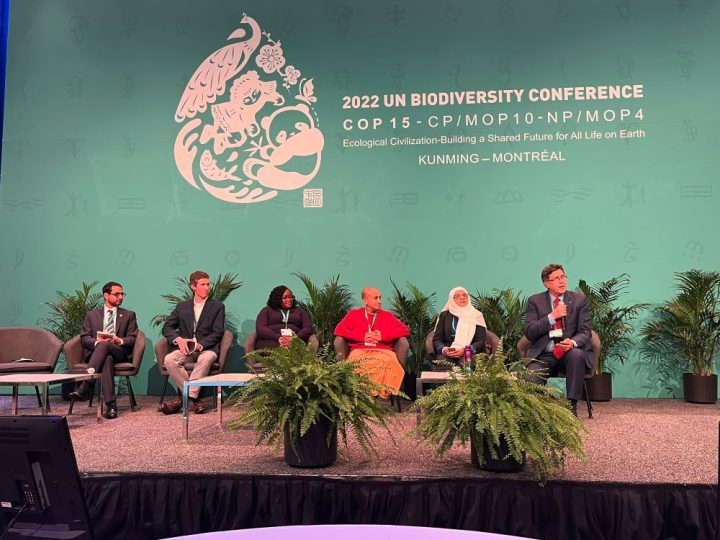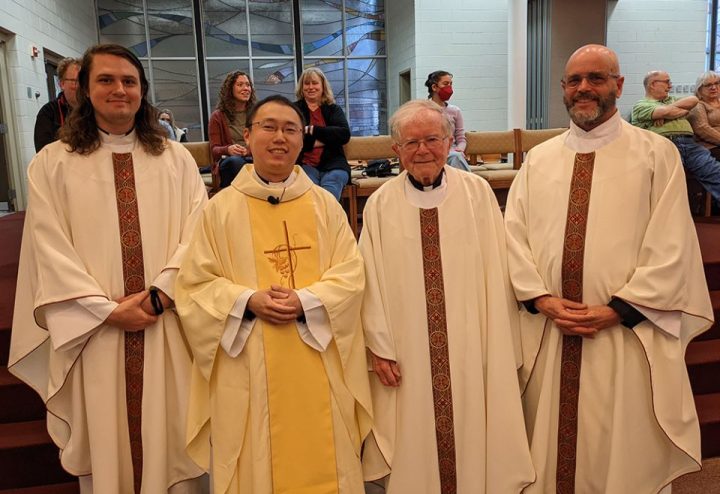
In « Teilhard: Visionary Scientist, » a new documentary to be broadcast on PBS, four key ideas emerge from the life and mind of Jesuit Fr. Pierre Teilhard de Chardin (1881-1955): evolution, integration, fire and passion.
The fascinating visionary, paleontologist, theologian, geologist, philosopher, evolutionary theorist and mystic provides ample subject matter for a two-hour documentary. In an exclusive interview for NCR, producer Mary Frost told me the film had taken 13 years to accomplish — shot in four countries on three continents (France, China, England and the U.S.) in 25 locations.
Mary and her co-producer husband Frank Frost made seven research trips to prepare for the film, followed by seven shooting trips. They interviewed 30 experts and banked 200 hours of video material that took them two years to edit. Jesuit Fr. Eddie Siebert of Loyola Productions did the cinematography and Taiwan-based Jesuit Fr. Jerry Martinson (who consulted on Martin Scorsese’s 2016 film « Silence« ) was their Mandarin interpreter on shoots in China. Sadly, Martinson passed away in 2017, before « Teilhard » was completed.
Born and educated in France, Teilhard de Chardin was introduced to the study of stones and rocks by his father, Emmnuel, and to the life of faith by his mother, Berthe-Adele. While still a young boy, Teilhard had an existential crisis about the impermanence of matter, but as he matured spiritually, he began to understand that spirit and matter, the divine, the world, the universe, humanity and all creation are connected. He entered the Jesuits just before his 18th birthday and began to express these ideas in his writing from the front during World War I, during which he served as a medic.
Teilhard believed in evolution, and at his death he continued to believe that the world was still « becoming » under God’s creative action. While his influence on the Second Vatican Council is well documented, anyone who has read and studied « Laudato Si’, on Care for Our Common Home » will recognize Pope Francis’ own high regard for Teilhard’s vision of God, respect for creation and the transforming power of love.
American Catholic novelist Flannery O’Connor described Teilhard’s words as the work of an artist, saying, « Teilhard’s view of evolution as the spiritualizing of matter is close to the poet’s. »
As a film, « Teilhard: Visionary Scientist » accomplishes two goals. First, it is an exceptional narrative made from documentary footage, recent interviews with key experts and Teilhard’s relatives in the United States, France and China; old photographs and new photos taken during the filming; and the select use of the Jesuit’s writings. From these, a substantive, thought-provoking and inspiring biography emerges.
Second, the film introduces Teilhard’s ideas — such as the « noosphere, » a term he coined that refers to the interconnected realm of human thought and consciousness evolving toward collective spiritual unity. This profound film reveals much about a man whose life, work and ideas are only becoming more relevant to science, philosophy and theology. « Teilhard » never loses you.
Biographer Ursula King‘s contributions — as well as those of others — help develop the portrait of a man who was at once prophet, priest, Jesuit, scientist and mystic. Their research is keenly evident in the choice of Teilhard’s words, voiced by Frank Frost, and the smooth tenor of narration by media producer (and Franciscan friar) Greg Friedman.
Teilhard was a controversial theologian. When he tried to reconcile science and faith by questioning whether humanity descended from Adam and proposed another way original sin may have entered the world, he was obliged to affirm six doctrinal teachings or risk being expelled by the Society of Jesus. Though he did affirm the teachings, he lost his position as a teacher and was exiled to China, where he worked as a paleontologist (and is still revered today).
In November 1957, after his death, the church decreed that his books could not be held in libraries of seminaries and religious institutes, nor carried in Catholic bookstores. It is interesting, however, that none of his books were ever placed on the Index of Forbidden Books, which until 1962 was still adding titles, in whole or in part, that were deemed dangerous or against faith and morals.
Advertisement
But the filmmakers find little, if anything, to critique in Teilhard’s life or writings, though they are open about the doctrinal issues with his Jesuit superiors and the somewhat controversial influence that women had in his life as a celibate religious.
What would Pierre Teilhard de Chardin think about the experimentation with evolution happening today? For example, the genetic editing and DNA technology being used to « de-extinct » the woolly mammoth? I asked Mary Frost this question and she admitted we cannot know for sure, though she pointed out that he « said in his later years that he was not interested so much in the past but in the future, particularly the evolution of consciousness. »
Most important, Frost emphasized, is that those interested in the work of Teilhard de Chardin « not shut down medical or scientific research because it seems beyond the pale, but do be concerned that the most important choices we make are furthering the evolution of union and love. »



